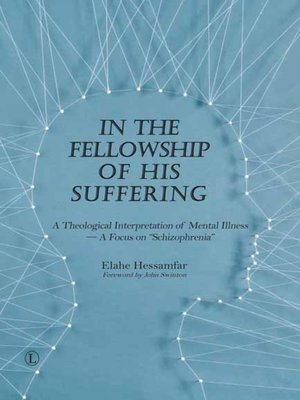In the Fellowship of His Suffering
ebook ∣ A Theological Interpretation of Mental Illness — A Focus on "Schizophrenia"
By Elahe Hessamfar

Sign up to save your library
With an OverDrive account, you can save your favorite libraries for at-a-glance information about availability. Find out more about OverDrive accounts.
Find this title in Libby, the library reading app by OverDrive.



Search for a digital library with this title
Title found at these libraries:
| Library Name | Distance |
|---|---|
| Loading... |
Schizophrenia is often considered one of the most destructive forms of mental illness. Elahe Hessamfar’s personal experience with her daughter’s illness has led her to ask some pressing and significant questions about the cause and nature of schizophrenia and the Church’s role in its treatment.
With a candid and revealing look at the history of mental illness, In the Fellowship of His Suffering describes schizophrenia as a variation of human expression. Hessamfar uses a deeply theological rather than pathological approach to interpret the schizophrenic experience and the effect it has on both the patients and their families. Effectively drawing on the Bible as a source of knowledge for understanding mental illness, she offers a reflective yet innovative view of whether the Church could or should intervene in such encounters and what such an intervention might look like.
Hessamfar’s comprehensive work will provoke powerful responses from anyone interested in the prominent social issue of mental illness. Her portrayal of the raging debate between treating “insanity” either pastorally or medically will enthral readers, be they Christians, medical students or those in the field of psychiatry and social sciences.
With a candid and revealing look at the history of mental illness, In the Fellowship of His Suffering describes schizophrenia as a variation of human expression. Hessamfar uses a deeply theological rather than pathological approach to interpret the schizophrenic experience and the effect it has on both the patients and their families. Effectively drawing on the Bible as a source of knowledge for understanding mental illness, she offers a reflective yet innovative view of whether the Church could or should intervene in such encounters and what such an intervention might look like.
Hessamfar’s comprehensive work will provoke powerful responses from anyone interested in the prominent social issue of mental illness. Her portrayal of the raging debate between treating “insanity” either pastorally or medically will enthral readers, be they Christians, medical students or those in the field of psychiatry and social sciences.







